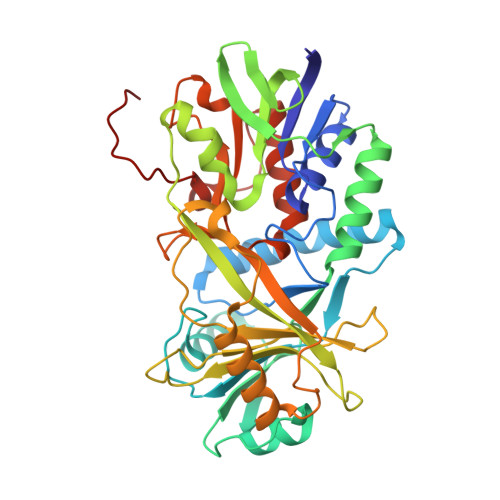Factors that affect oxygen activation and coupling of the two redox cycles in the aromatization reaction catalyzed by NikD, an unusual amino acid oxidase.
Kommoju, P.R., Bruckner, R.C., Ferreira, P., Carrell, C.J., Mathews, F.S., Jorns, M.S.(2009) Biochemistry 48: 9542-9555
- PubMed: 19702312
- DOI: https://doi.org/10.1021/bi901056a
- Primary Citation of Related Structures:
3HZL - PubMed Abstract:
NikD is a flavoprotein oxidase that catalyzes the oxidation of piperideine-2-carboxylate (P2C) to picolinate in a remarkable aromatization reaction comprising two redox cycles and at least one isomerization step. Tyr258 forms part of an "aromatic cage" that surrounds the ring in picolinate and its precursors. Mutation of Tyr258 to Phe does not perturb the structure of nikD but does affect the coupling of the two redox cycles and causes a 10-fold decrease in turnover rate. Tyr258Phe catalyzes a quantitative two-electron oxidation of P2C, but only 60% of the resulting dihydropicolinate intermediate undergoes a second redox cycle to produce picolinate. The mutation does not affect product yield with an alternate substrate (3,4-dehydro-L-proline) that is aromatized in a single two-electron oxidation step. Wild-type and mutant enzymes exhibit identical rate constants for oxidation of P2C to dihydropicolinate and isomerization of a reduced enzyme.dihydropicolinate complex. The observed rates are 200- and 10-fold faster, respectively, than the mutant turnover rate. Release of picolinate from Tyr258Phe is 100-fold faster than turnover. The presence of a bound substrate or product is a key factor in oxygen activation by wild-type nikD, as judged by the 10-75-fold faster rates observed for complexes of the reduced enzyme with picolinate, benzoate, or 1-cyclohexenoate, a 1-deaza-P2C analogue. The reduced Tyr258Phe x 1-cyclohexenoate complex is 25-fold less reactive with oxygen than the wild-type complex. We postulate that mutation of Tyr258 causes subtle changes in active site dynamics that promote release of the reactive dihydropicolinate intermediate and disrupt the efficient synchronization of oxygen activation observed with wild-type nikD.
- Department of Biochemistry and Molecular Biology, Drexel University College of Medicine, Philadelphia, Pennsylvania 19102, USA.
Organizational Affiliation:



















